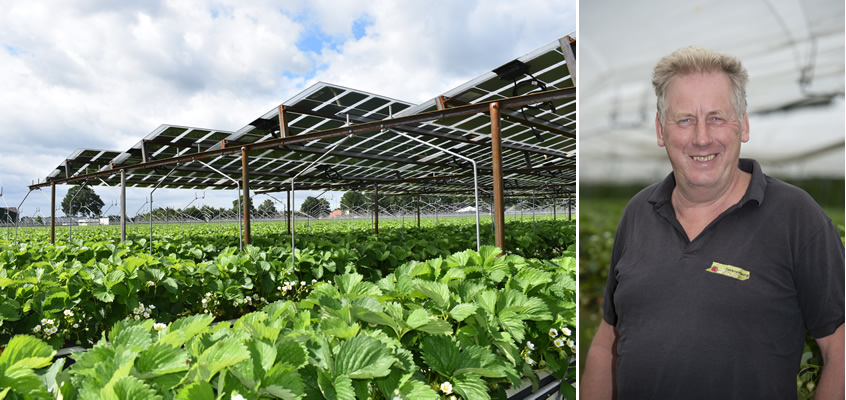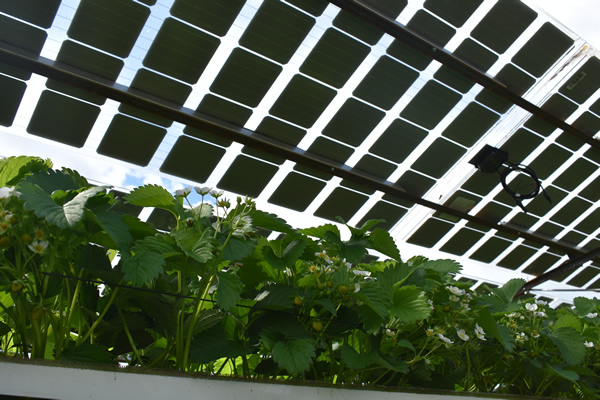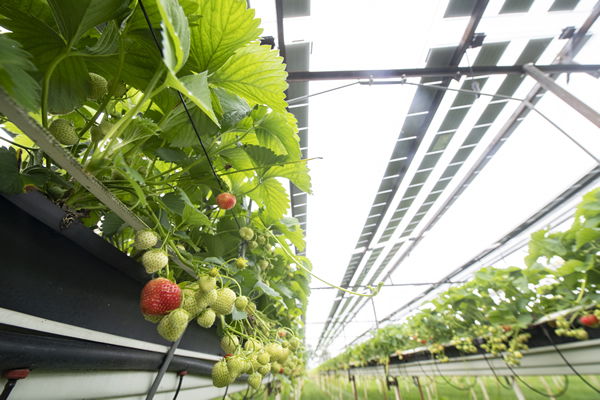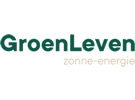Fruit cultivation is undergoing a transition. The weather is changing, and there is an increasing focus on sustainability. These factors are leading growers to ‘future-proof’ their operations. That is the case at Theo Swinkels and Carina Manders’ strawberry farm too. They run the De Zijp horticultural company in the Netherlands.
As a trial, the solar energy company, GroenLeven, has placed solar panels above some of Theo’s strawberries. This is one of the sustainable measures Theo is deploying and researching. “Solar energy is a good thing. I want to participate in that,” begins Theo.
Theo was about 14 when he first encountered strawberry cultivation. “My brothers and I picked strawberries at a nearby grower as a side job. At one point, we could take some of the plants home. We planted those near my parents’ house. That grew into an open field farm.” The brothers eventually went their separate ways, each with their own horticultural business. Theo continued growing strawberries.

Theo has seen the weather conditions change over time. “You usually grow strawberries in the open. But the summers are warmer, and there’s more precipitation and dry weather. So, we’ve had to switch to protected cultivation. Nowadays, strawberries are increasingly grown in racks. Those are covered with plastic sheeting.”
Those plastic covers provide protection but are not the most sustainable choice. And Theo is committed to making his business more sustainable. “We no longer grow the plants in the ground. That, in itself, is much more environmentally friendly. We ensure that the (organic) substances we use don’t end up in the soil, when we control weeds and pests. I grow Planet Proof and have various certifications like GlobalGAP. So a plastic canopy doesn’t fit into that at all,” he continues.

In 2020, solar panels emerged as an alternative for this plastic sheeting. Along with GroenLeven, Theo installed a pilot system last year. It is above a small part of his strawberry plants. “This allowed us to study the solar panels’ effect on the strawberries. The sun’s strong rays were increasingly affecting the strawberries. The panels turned out to be ideal for darkening those slightly.”
“However, I’d noticed that the strawberries need more light than they were getting under the panels. That’s why we are now setting up another system. It’s adjacent to the first and has lighter panels. We can see if that provides the golden mean between crop and energy yield,” explains Theo.
The solar panels’ dual function is something he would like to see used more in the Netherlands. “It seems many people aren’t yet very familiar with solar panels’ potential dual functions. These functions must become a commonly known concept. Perhaps then everyone will support using such innovations. After all, don’t we want to strengthen our world? And make it more sustainable for the future generations?”

There is increased interest in his solar panel project in Theo’s area. “Our region has drawn up a Regional Energy Strategy. It encourages initiatives like this. That’s why my solar energy project appeals to the council and residents. It fits exactly into that strategy. We generate power without using additional land and without aesthetically impacting residents,” he says.
Theo, therefore, sees a future in fruit farming for sustainable solutions like solar panels above soft fruit plants. “This trial set-up will show us which balance between solar panels and fruit will be most lucrative. It’s still too early to draw that conclusion. But one thing is certain – many more growers will have to take their crops out of the ground and cover them more. As things stand, why still opt for plastic? Perhaps you’ll end up with a double function like this.”
Innovating together for a cleaner world
More and more fruit farmers are showing interest in an agri-PV solution like Theo has implemented. Willem de Vries, agri-PV project manager at Groenleven, explains: “A dual-function like this is an example of the energy transition. It not only provides green power. But, as Theo explained, it has various advantages for the grower too.”
“Would you like to join forces with GroenLeven? GroenLeven will guide the entire process. For instance, when applying for an SDE (Stimulating Sustainable Energy Production) subsidy. This is how, together, we can take innovative steps for a better world,” Willem concludes.
 For more information:
For more information:
GroenLeven
Tel: +31 (0) 587 990 000
Website: www.groenleven.nl/agri-pv
